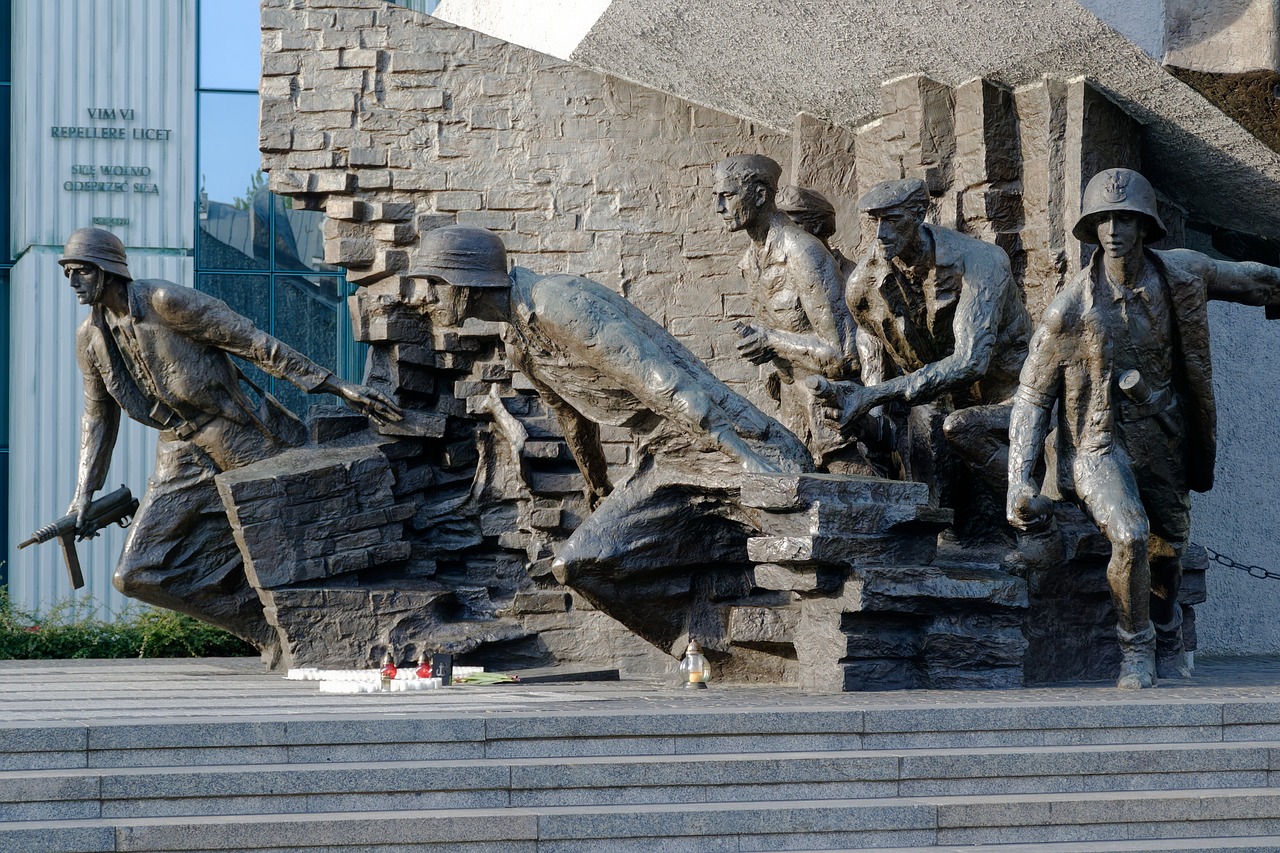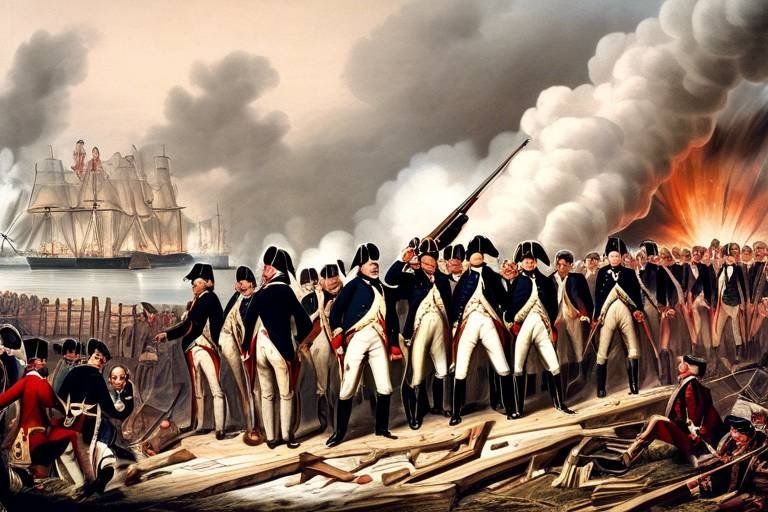The Causes of the War of 1812 - A Historical Overview
Exploring the underlying factors and events that led to the War of 1812 between the United States and Great Britain, shaping the course of history in North America during the early 19th century.

Impressment of American Sailors
Exploring the underlying factors and events that led to the War of 1812 between the United States and Great Britain, shaping the course of history in North America during the early 19th century.
The impressment of American sailors by the British Navy was a contentious issue that significantly contributed to the outbreak of the War of 1812. British naval officers would seize American sailors, claiming they were deserters or British subjects, and force them into service aboard their ships. This violation of American sovereignty and the rights of its citizens was a major point of contention between the two nations.
This practice not only disrupted American trade and commerce but also led to widespread outrage among the American public. The forced conscription of American sailors into the British Navy was seen as a direct assault on American freedom and independence. The continued impressment of American seamen fueled anti-British sentiments and played a crucial role in pushing the United States towards war.
Despite diplomatic efforts to address the issue of impressment, including the signing of treaties such as the Jay Treaty, the British practice persisted and continued to inflame tensions between the two nations. The failure to resolve the matter through peaceful means ultimately set the stage for the conflict that would become known as the War of 1812.
The impressment of American sailors was not only a violation of international law but also a direct affront to the sovereignty of the United States. It served as a catalyst for the growing animosity between the two nations and played a significant role in the decision to declare war on Britain in 1812.
1. What were the main causes of the War of 1812?
2. How did the impressment of American sailors contribute to the outbreak of the war?
3. What role did Native American relations play in the conflict?
4. Why did the War Hawks in Congress advocate for war with Britain?

Trade Restrictions and Blockades
Exploring the underlying factors and events that led to the War of 1812 between the United States and Great Britain, shaping the course of history in North America during the early 19th century.
During the early 19th century, trade restrictions and blockades imposed by Britain had a significant impact on American commerce, sparking economic turmoil and contributing to the eruption of the War of 1812. British naval blockades hindered American trade routes, disrupting the flow of goods and causing severe economic hardships for American merchants and traders.
Furthermore, British restrictions on American trade with other nations limited the growth and prosperity of the young American economy. The inability to freely engage in international trade stifled economic development and fueled resentment towards British policies among American citizens and government officials.
The combination of trade restrictions and blockades not only threatened the economic stability of the United States but also undermined its sovereignty and independence as a nation. The restrictions imposed by Britain were viewed as a direct assault on American economic interests and contributed to the growing tensions that ultimately led to the outbreak of the War of 1812.
- What were the main causes of the War of 1812?
- The main causes of the War of 1812 included impressment of American sailors, trade restrictions and blockades, conflicts with Native American tribes, American expansionist ambitions, aggressive War Hawks in Congress, British support for Native Americans, violations of American sovereignty, and failed diplomatic efforts.
- How did trade restrictions and blockades contribute to the War of 1812?
- Trade restrictions and blockades imposed by Britain severely impacted American commerce, leading to economic hardships and fostering resentment among American citizens. The disruption of trade routes and limitations on international trade fueled tensions between the United States and Britain, ultimately playing a key role in the outbreak of the War of 1812.
- What was the significance of the War of 1812 in American history?
- The War of 1812 was a pivotal moment in American history as it solidified the nation's independence, established its sovereignty, and shaped its future relations with other global powers. The conflict highlighted the importance of protecting American interests and asserting its position on the world stage.

Native American Relations
Exploring the underlying factors and events that led to the War of 1812 between the United States and Great Britain, shaping the course of history in North America during the early 19th century.
Native American relations played a crucial role in the lead-up to the War of 1812. The interactions between Native American tribes, the United States, and Great Britain were complex and often contentious. Both British and American forces sought alliances with various Native American groups, leveraging their support in the conflict.
For Native American tribes, the war presented a challenging dilemma. Some tribes saw an opportunity to resist American expansionism with British support, while others sought to maintain neutrality or forge alliances with the United States. The involvement of Native Americans in the war was not uniform, with different tribes making varied choices based on their own interests and circumstances.
The conflicts over territory and influence exacerbated existing tensions between Native American tribes and the expanding United States. The British support for Native American resistance to American encroachment further fueled hostilities and contributed to the outbreak of the War of 1812.
Throughout the war, Native American tribes faced difficult decisions about which side to support, often facing internal divisions and external pressures. The outcomes of these choices had lasting impacts on the relationships between Native Americans, the United States, and Great Britain, shaping the post-war landscape of North America.

Manifest Destiny and Expansion
Exploring the underlying factors and events that led to the War of 1812 between the United States and Great Britain, shaping the course of history in North America during the early 19th century.
The concept of Manifest Destiny, a belief deeply rooted in American ideology, played a significant role in the decision to go to war with Britain in 1812. This notion, driven by the belief that it was America's destiny to expand its territory from coast to coast, fueled the desire for westward expansion. The vast lands to the west were seen as opportunities for growth, prosperity, and the spread of American values.
As the United States sought to fulfill its vision of Manifest Destiny, tensions with Britain arose due to conflicting territorial ambitions. The British presence in North America, particularly in regions desired by American settlers, posed a challenge to the expansionist goals of the young nation. The desire to secure control over key territories and trade routes further fueled the push towards war.
Moreover, the American belief in Manifest Destiny was not merely about territorial expansion but also about asserting dominance and influence in the region. The idea that the United States was destined to become a great nation with a powerful presence in North America drove policymakers and leaders to take decisive actions to secure their vision of the future.
Ultimately, the concept of Manifest Destiny and the drive for expansion played a crucial role in shaping the mindset of Americans leading up to the War of 1812. The belief in a divine mission to expand the nation's borders and influence fueled the determination to confront British interests and solidify American control over the continent.

War Hawks in Congress
Exploring the underlying factors and events that led to the War of 1812 between the United States and Great Britain, shaping the course of history in North America during the early 19th century.
British practice of capturing American sailors and forcing them into naval service fueled tensions and was a key grievance leading to the War of 1812.
British blockades and trade restrictions severely impacted American commerce, leading to economic hardships and contributing to the outbreak of the War of 1812.
Conflicts over territory and support from British and American forces fueled tensions with Native American tribes, playing a significant role in the War of 1812.
American desires for territorial expansion and the belief in manifest destiny influenced the decision to go to war with Britain in 1812.
War Hawks in Congress: During the early 19th century, a group of aggressive politicians known as War Hawks emerged in the United States Congress. These individuals were fervent advocates for war with Britain and played a crucial role in pushing the country towards conflict. Citing reasons such as national honor, territorial expansion, and defense, the War Hawks fervently argued for military action against Britain. Their influence and relentless pursuit of war significantly contributed to the eventual outbreak of the War of 1812.
British alliances and support for Native American tribes in resisting American expansionism further strained relations and contributed to the outbreak of the War of 1812.
British violations of American sovereignty, including impressment, interference with trade, and support for Native Americans, were key factors leading to the declaration of war in 1812.
Despite attempts at negotiation and resolution, diplomatic efforts between the United States and Britain failed to address the underlying issues, ultimately resulting in the War of 1812.
Q: What were the main causes of the War of 1812?
A: The main causes of the War of 1812 included impressment of American sailors, trade restrictions and blockades by the British, conflicts with Native American tribes, American expansionist desires, the influence of War Hawks in Congress, British support for Native Americans, violations of American sovereignty, and the failure of diplomatic efforts to resolve tensions.
Q: How did the War Hawks influence the decision to go to war?
A: The War Hawks in Congress played a significant role in influencing the decision to go to war by advocating for military action against Britain. They cited reasons such as national honor, territorial expansion, and defense as justifications for war, swaying public opinion and pushing the country towards conflict.
Q: Did the War of 1812 have long-lasting effects?
A: Yes, the War of 1812 had long-lasting effects on both the United States and Great Britain. It solidified American independence, reshaped relationships with Native American tribes, and influenced future foreign policy decisions. Additionally, it marked the last major conflict between the two nations.

British Support for Native Americans
During the period leading up to the War of 1812, British support for Native American tribes played a significant role in escalating tensions between the United States and Great Britain. The British formed alliances with various Native American groups, providing them with weapons, supplies, and military assistance to resist American expansionism into their territories. This support not only fueled Native American resistance but also hindered American efforts to secure their western frontier.
Additionally, British support for Native Americans was seen as a direct challenge to American sovereignty and territorial ambitions. By backing indigenous peoples in their conflicts with American settlers and government forces, the British aimed to maintain their influence in North America and prevent further American expansion westward. This strategic maneuvering by the British government exacerbated existing tensions and contributed to the outbreak of hostilities in 1812.
Furthermore, the British support for Native Americans highlighted the complex geopolitical landscape of the early 19th century. It underscored the intertwined interests of European powers and indigenous populations in the face of American territorial ambitions. The alliances forged between the British and Native American tribes symbolized a broader struggle for dominance and control over the vast expanses of North America.

Violations of American Sovereignty
One of the primary factors that led to the outbreak of the War of 1812 was the repeated violations of American sovereignty by the British. These violations encompassed various actions that infringed upon the independence and rights of the United States, ultimately contributing to the decision to declare war.
The most prominent violation was the impressment of American sailors by the British Navy. This practice involved forcibly seizing American seamen and compelling them to serve in the British naval forces. Such actions not only violated the personal liberties of American citizens but also undermined the sovereignty of the United States by disregarding its jurisdiction over its own people.
In addition to impressment, British interference with American trade further encroached upon American sovereignty. The imposition of trade restrictions and blockades by the British severely limited American commerce and economic activities. These measures not only hindered the growth of the American economy but also challenged the sovereignty of the nation by dictating its trade relationships and impeding its ability to conduct business freely.
Furthermore, British support for Native American tribes in resisting American expansionism also constituted a violation of American sovereignty. By arming and assisting Native American forces against American settlers and troops, the British undermined the territorial integrity and authority of the United States. This support exacerbated conflicts with Native American tribes and intensified tensions between the United States and Britain.
Overall, the continuous violations of American sovereignty by the British, including impressment of sailors, trade restrictions, and support for Native Americans, played a crucial role in the decision to go to war in 1812. These actions challenged the independence and autonomy of the United States, prompting a response through military conflict to defend its sovereignty and assert its rights as a nation.

Failure of Diplomacy
Despite efforts to resolve tensions through diplomacy, the War of 1812 was ultimately sparked by the failure of diplomatic negotiations between the United States and Britain. Diplomatic relations between the two nations had been strained for years, with issues such as trade restrictions, impressment of American sailors, and British support for Native American tribes remaining unresolved.
Both sides attempted to avoid conflict through diplomatic means, engaging in negotiations and discussions to address their grievances. However, these efforts were met with challenges and obstacles that hindered the progress towards a peaceful resolution. The inability to reach a mutually satisfactory agreement led to growing frustrations and ultimately paved the way for war.
Despite diplomatic efforts to find common ground and alleviate tensions, deep-rooted issues and conflicting interests persisted, preventing a successful resolution. The failure of diplomacy highlighted the underlying differences and grievances that ultimately culminated in the outbreak of the War of 1812.

